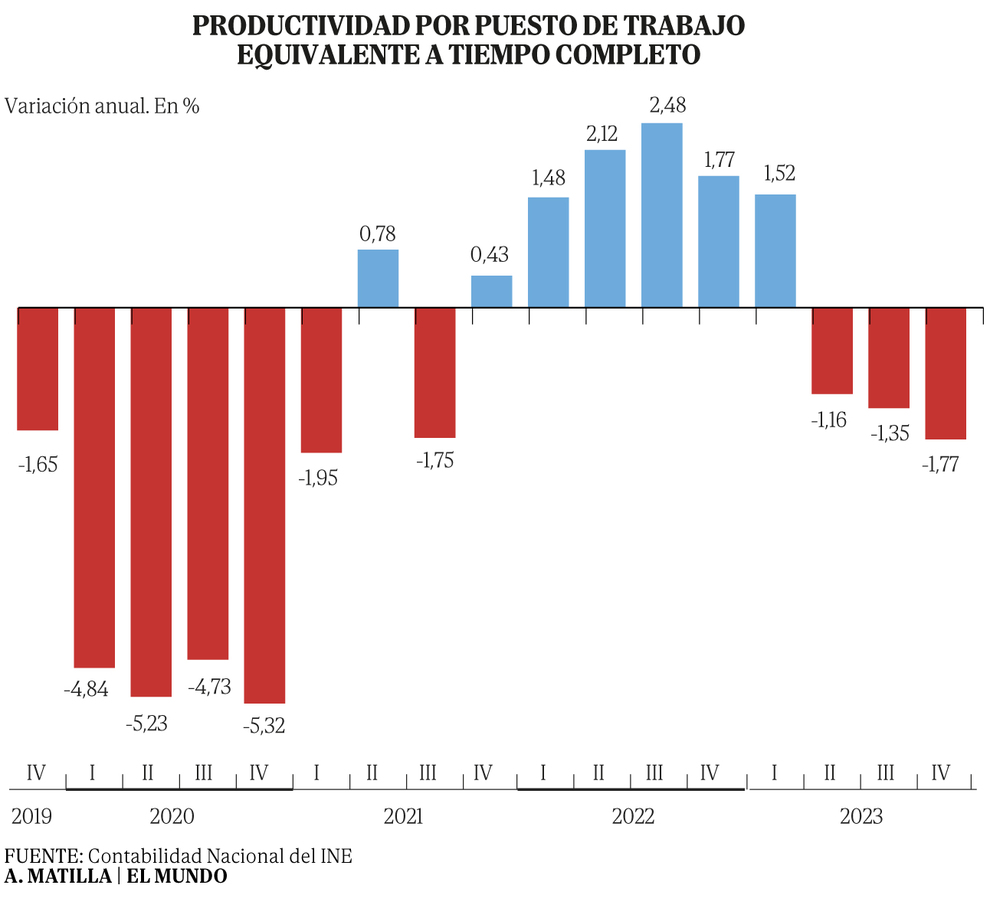Alejandra Olcese
Updated Wednesday, January 31, 2024-03:27
TFP Productivity has fallen by 7.3% since 2000, six-folding the gap in per capita income with the EU
Productivity
per hour worked
fell by 0.76%
in the fourth quarter of 2023, which represents the first drop since the pandemic and one of the few that has occurred in recent years, according to National Accounting data from the INE
.
.
So far this century, productivity per hour worked has only registered
negative rates in nine quarters out of 92
. As the OECD explains, this indicator measures "
the degree of efficiency
with which the labor input is combined with other production factors (for example, capital, intermediate inputs, technical changes, etc.) and used in the production process." ", understood as work contributed the total hours worked of the people who participate in production.
The
production
of a country - the GDP - depends, therefore,
not only on the factors
used to achieve it (the number of workers, in the case of labor productivity), but also on the
efficiency
with which they operate. Therefore, the fact that this decrease is bad news, since it denotes that workers are capable of producing less for each effective hour of work.
Work productivity in Spain is
closely related to the evolution of employment
. When this decreases, it is usually the jobs with the lowest added value - and therefore, less productive - that are destroyed first, so the productivity of the economy improves on average, as happened during the pandemic.
Since then, productivity per hour worked had grown steadily, but in the last quarter it has contracted because
work has grown more
- both in hours and in number of employees -
than GDP
. "GDP grew strongly in the fourth quarter (0.6% quarter-on-quarter), despite the fall in most components of investment.
The improvement in activity is entirely due to the increase in employment, since productivity fell
," pointed out yesterday
Rafael Doménech,
head of Economic Analysis at
BBVA Research.
The economist
Juan Francisco Jimeno
also highlighted that "without productivity growth" there has been an
increase in unit labor costs
"above 6%" and an increase in
remuneration
of 4.4%, since a priori any increase of wages should be based on a more productive workforce.
Labor productivity can also be measured by
full-time equivalent job
, an indicator that has accumulated three negative quarters, with drops of 1.2%, 1.35% and 1.8%, respectively. This decrease is due to the fact that in the last year employment has grown much faster than production, something that is also influenced by the fact that some of the sectors that have increased hiring the most are of low added value and not very productive.
Although professional, scientific and technical and health activities are those that have experienced the greatest increase in employed people in 2023 (from 165,300 and 138,600, according to the EPA), there have also been increases in
less productive activities
such as
construction
(108,300),
food and beverage
services
(87,000) and
wholesale (75,400) and retail
trade
(73,400); Therefore, approximately four out of every ten new jobs are in less productive sectors.
Reduction of working hours and productivity
Productivity increases are what allow companies to increase their labor costs (raise salaries) or reduce the working day, since their employees will be able to
produce more in less time.
However, the Government is unilaterally considering cutting by law the maximum working day from 40 to
37.5 hours starting in 2025.
This measure, according to the second vice president and Minister of Labor,
Yolanda Díaz,
will boost productivity, since she believes that workers will have an
incentive
to be more efficient if they work less time.
However, the
Ministry of Economy
itself rules out this approach. "It would not have to affect productivity," said yesterday the Secretary of State for the Economy,
Israel Arroyo
, although he admitted that "the literature is quite ambiguous in that sense," since it reflects both positive and negative aspects.
In a scenario in which employees work fewer hours while being equally productive,
their production will fall
in the same proportion as the number of hours they work decreases, which would cause a
fall in GDP.
A decrease in the hours worked while maintaining the same level of salary would only allow the level of production to be maintained if the productivity of the workers - or the rest of the factors - compensates for this reduction in working hours, but there is nothing that guarantees that this improvement will occur, especially given the evolution of the indicator in recent years and in comparison with
the rest of the countries of the European Union.
In 2000, the nominal GDP per hour of work in Spain was equivalent to 61% of that of Germany, while two decades later, that ratio stood at 63%, just two points higher.

